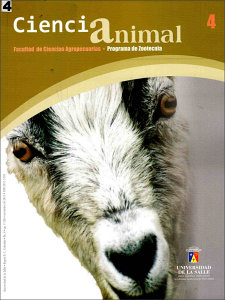Abstract
Animal production systems in Colombia are mostly represented by stockbreeding and characterized by the generation of animal protein (required to meet the dietary needs of human population). Cattle production development has had a negative effect on ecosystems, due to the livestockization of the agricultural frontier, greenhouse gas emissions and the indiscriminate use of agrotoxins affecting the air, soil and water of the system where it is performed. However, the new millennium’s challenge is to suggest management alternatives that generate eco-friendly models, guarantee ecological sustainability, animal productivity and food sovereignty by using promissory vegetable species that help to reestablish ecological balance, which has been fractured by climate change in the planet. The zootechnician’s challenge should aim to counterbalance these changes with technological innovation and management options that guarantee animal protein productionDownloads
Download data is not yet available.



